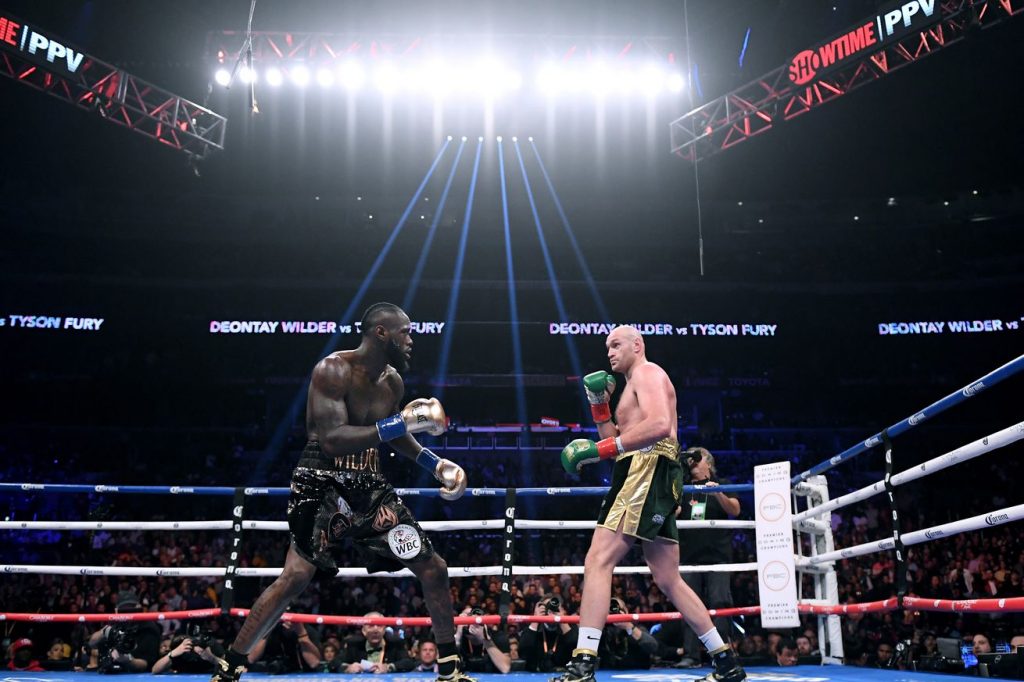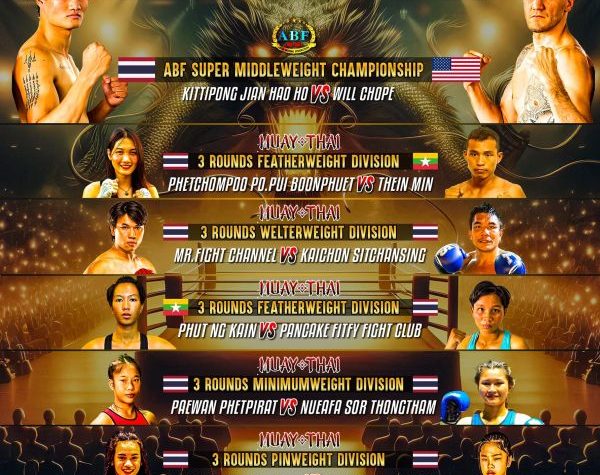
With flyweights now a protected species on the verge of extinction in the UFC, Saturday night’s boxing-UFC heavyweight doubleheader felt kind of like prelude to the return of the Big Men in combat sports. Out in Los Angeles, Tyson Fury faced Tuscaloosa’s Deontay Wilder in a heavyweight title pay-per-view that could have taken place under candlelight, the vibe was so romantic. It’s been a long, long time since boxing’s heavyweight division looked as attractive. Wilder rolled out wearing a crown and a mask with Jay Rock rapping in front of him, and waiting for him in the ring was Fury, a Gru-looking figure who can strafe the smile off your face from 25-feet.
Some 8,200 miles away, in Adelaide, Australia, Mark Hunt was fighting his last fight for the UFC, while his protégé — Tai Tuivasa — was rolling to the hole with a pack of aboriginal singers for his bout with Junior dos Santos. The ceremonies felt big for each main event, because the principals are big. Big men in big moments, with all the rituals in place to give the optimum sense of foreboding. What is being forbade, and has been since the days of Jack Johnson? The exhilarating idea that somebody was going to get knocked out. Only heavyweights can captivate the imagination as well. The word itself is a tradition that your grandfathers used to regenerate their sense of thrill: Heavyweight.
It meant a collective experience; some primal release of awe that could be communicated.
In the case of Fury and Wilder, it was thought that Wilder’s best chance was to land one noise-cancelling shot early in the bout — that if Fury was left to get into a rhythm, it would be a long night for the “Bronze Bomber.” Of course, there’s nothing more satisfying than being wrong in the fight game. Wilder didn’t catch Fury early. Instead, using his mesmerizing twitch-and-tweak movement, Fury began filling out the scorecards. Like a big stationary thing with blurred edges, he was like trying to punch a bar of soap, slipping this way and that, anticipating every punch from its point of origin and rolling instinctively to where those punches weren’t.
Beautiful? Goddamn yes it’s beautiful. Every limb — every tick, and every feint — was deceptive. His jabs, some slapping some to the whites of the knuckle, fired off like music salvos, and when he wasn’t throwing it was like he was jonesing — 250-pounds of abstractly controlled impulses. It was high art, with timely buffoonery. At one point Wilder flicked his tongue at him like a snake, and Fury shot his tongue out too, only his mimicry had the colder feel of the asylum. Two heavyweights doing a poke and riposte routine.
The great thing was that Wilder never truly bit; he just kept hammering, swinging, trying to accomplish what he was put on Earth to do — that is, take Fury’s head off. It wasn’t until the ninth round, when most assumed he was down on the scorecards, that he landed big enough to drop Fury, a feat that gave momentary astonishment to everyone watching. Just when Fury seemed to restore order in the 10th and 11th, Wilder knocked Fury out in the final round. A combo from hell. He walked away and did a throat slash, knowing his own power had finally broke through. Yet Fury, somehow — in a resurrective burst that he later attributed to a “holy hand” — got up. He finished the fight. Most thought he still did more than enough to win. The judges were split.
It ended in a draw. Oh boxing, how you torture your audiences. What is the old saying? That the hottest places in hell are reserved for those who, in times of moral crisis, maintain their neutrality? One can imagine that hell is nothing more than a huge congregation of boxing judges and the sound of diabolical laughter.
And yet what was more amazing? The fact that one judge gave Wilder the fight 115-111? Or that Fury came equipped with internal smelling salts, in the event that Wilder broke through the snake-charmer trance and knocked him to the canvas? Or that Wilder broke through at all, so late in a fight that had established its pattern of technique over attitude and power?
In any event, it was a classic heavyweight fight — it was the heavyweight showcase that boxing needed. Wilder was downing decades of dormancy; Fury rose like the ghost of Joe Frazier.
And it all happened just in time to switch back over to Tuivasa’s fight with Dos Santos. Tuivasa, fighting in front of his countrymen, tried to break Dos Santos early. He bull-rushed, he loaded up, he uncorked — and he landed. But JDS didn’t go away. He kept coming, and in the second round connected on a short right that undid Tuivasa. That prevented him from taking the baton from Hunt. That kept him from advancing the heavyweight division into a new era. Heavyweight fights are like that; powerfully independent of scholarly prediction.
It’s true in any weight class, that a single punch can change the narrative of a fight. Chocolatito can do it the same as John Dodson. But the essential magic of a heavyweight fight is in prospect, that two behemoths are scheduled to collide, and that one of them — perhaps inconceivably — will lose. That idea is what makes the moment, when it arrives, as big as the principals, which the UFC has realized for a long time. And boxing had it, once again, on Saturday night. Wilder-Fury was everything it was meant to be. Oddly one of them didn’t lose.
But from the standpoint of heavyweight boxing being back, everybody won.






